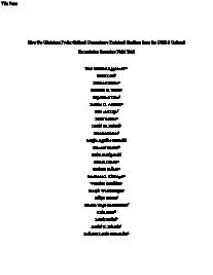How Do Clinicians Prefer Cultural Competence Training? Findings from the DSM-5 Cultural Formulation Interview Field Trial
Objective
This study’s objective is to analyze training methods clinicians reported as most and least helpful during the DSM-5 Cultural Formulation Interview field trial, reasons why, and associations between demographic characteristics and method preferences.
Method
The authors used mixed methods to analyze interviews from 75 clinicians in five continents on their training preferences after a standardized training session and clinicians’ first administration of the Cultural Formulation Interview. Content analysis identified most and least helpful educational methods by reason. Bivariate and logistic regression analysis compared clinician characteristics to method preferences.
Results
Most frequently, clinicians named case-based behavioral simulations as “most helpful” and video as “least helpful” training methods. Bivariate and logistic regression models, first unadjusted and then clustered by country, found that each additional year of a clinician’s age was associated with a preference for behavioral simulations: OR = 1.05 (95 % CI: 1.01–1.10; p = 0.025).
Conclusions
Most clinicians preferred active behavioral simulations in cultural competence training, and this effect was most pronounced among older clinicians. Effective training may be best accomplished through a combination of reviewing written guidelines, video demonstration, and behavioral simulations. Future work can examine the impact of clinician training satisfaction on patient symptoms and quality of life.
Geachte bezoeker,
De informatie die u nu opvraagt, kan door psychotraumanet niet aan u worden getoond. Dit kan verschillende redenen hebben,
waarvan (bescherming van het) auteursrecht de meeste voorkomende is. Wanneer het mogelijk is om u door te verwijzen naar de bron
van deze informatie, dan ziet u hier onder een link naar die plek.
Als er geen link staat, kunt u contact opnemen met de bibliotheek,
die u verder op weg kan helpen.
Met vriendelijke groet,
Het psychotraumanet-team.
In: Academic psychiatry, ISSN 1042-9670 | 40 | 4 | August | 584-591
http://doi.org/10.1007/s40596-015-0429-3


